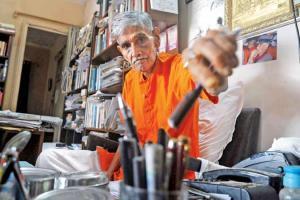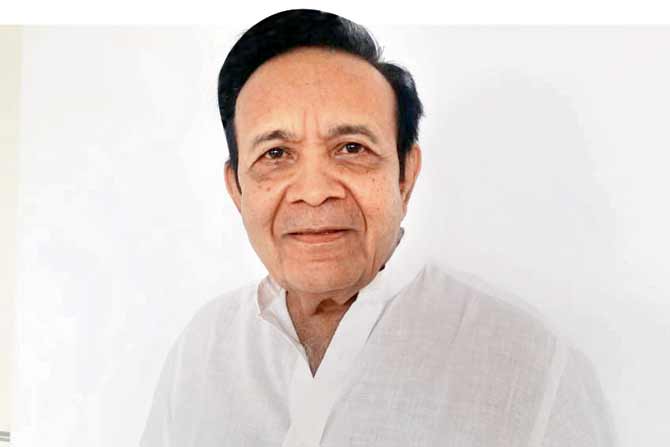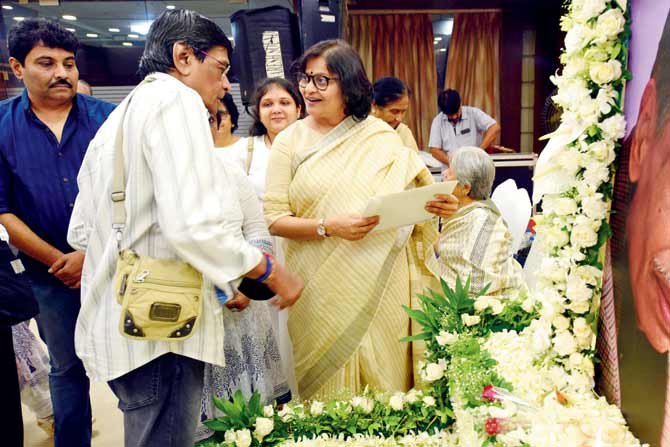Lovers of literature, newshounds and journalists remember late Kanti Bhatt, the columnist-journalist who wrote doggedly every day to see his column appear, even on the day he passed on

A file photo of Kanti Bhatt at his Borivli home in 2015. Sheela Bhatt says there wasn't a nook in the house where you wouldnu00c3u00a2u00c2u0080u00c2u0099t find a book. Pic /Nimesh Dave
Those who saw the lanky Kanti Bhatt often perceived him as docile. "He was anything but that," clarifies Bharat Ghelani, editor of Gujarati news magazine Chitralekha, while mentioning his "special guts". The first 'superstar of Gujarati journalism', 'master of all' and 'beloved mentor' to many, Bhatt passed away at 88 on August 4.
Bhatt was the son of a farmer from Zanzmer village in Bhavnagar district of Gujarat. He was academically inclined, and graduated in commerce before he began to teach. Later, he spent several years in Penang with his uncle while he handled his business. After a fallout with him, Bhatt came to Mumbai in 1966 with three options before him: a job at the State Bank of Saurashtra, at cultural venue Kora Kendra, and the lowest paying one—as financial journalist at Vyapar.
At Vyapar, Bhatt quickly proved his mettle. Once he made a name, he wrote for a string of publications, including Chitralekha, Mumbai Samachar, Janshakti, Sandesh, Yuva Darshan and Jansatta. He also launched one of Gujarat's most popular news magazine, Abhiyaan with his journalist wife Sheela Bhatt and publisher Ashwin Parekh.
Bhatt's reportage had a unique style that mixed investigation and information. Ghelani gives an example. "If we were talking about potatoes and the method of farming in Scandinavia, he'd give the reader an in-depth picture of how potatoes landed in the Nordic country, travelled to India, and so, made it a relatable piece. And this was when there was no Google. He relied entirely on interviews with people, and personal research," says Ghelani, adding that Bhatt wrote for Chitralekha from 1969 to 2017.
But, not all of what he wrote was gentle. He covered tragedies, politics and the Bhopal Gas tragedy with Ghelani. "Ae mara constant saathi hata [he was my constant companion]. He was daring; we have faced mobs together."
Over 1979-80, in a series of incidents, the Indian police was accused of blinding 31 undertrials in Bhagalpur, Bihar. Ghelani says Bhatt reported of the controversy that saw contradicting versions and severe criticism of the state machinery.
 Dr Prakash Kothari
Dr Prakash Kothari
Mumbai-based sexologist Dr Prakash Kothari fondly remembers Bhatt, his friend of 50 years, as a young journalist who came to interview him in the 1960s. "Harkisan Mehta, the editor of Chitralekha and some other magazines, had assigned Kanti to interview me for Beej. "After he left, I called up Mehta to enquire about Bhatt. No one had asked me the questions he had," says Kothari. Bhatt had no prior knowledge of sexual medicine. He was simply a dedicated journalist, "a mini Google of those times," says Kothari. "Je maanta, e lakhta, ane je lakhta, e jivta [What he believed, he reported, and what he reported, he lived by]."
At one event, Kothari remembers being joined by Bhatt and veteran journalists Harkisan Mehta, Tarak Mehta and Chandrakant Bakshi. "In a question-answer slot, Bakshi stumbled on an answer. Bhatt intervened and covered up for his friend. When I teased Bakshi, he said to me, 'Dosto ane daru, joona sara. Ramakda nava sara [Old friends and alcohol are the best. If you seek the new, look for toys]. Bhatt is an old but true friend'."
On July 20, author and senior journalist Aashu Patel, whom Bhatt considered his manas putra (soul son), organised an event to honour Bhatt with a dandiya session, along with Sheela Bhatt and Uday Majumdar. This was Bhatt's 88th birthday. "He loved to do garba, and what a sight it was to watch him dance," says Patel, former editor of leading newspapers and founder-editor of Gujarati magazine Cocktail Zindagi.
Patel was also the last person to have met Bhatt a few hours before his death. "I was with him at the hospital and then his home the previous day. We chatted for hours on his birthday last month," Patel remembers, recalling his early years in a village near Porbandar. While working at the farm with his father and running a small shop with his older brother, he dreamt of becoming a journalist. At 16, he wrote his first letter to Bhatt, and several after. "One day, I got a reply. It said: 'Looking at your writing and thoughts, it seems like you can be a journalist.'"
Patel, who was yet to graduate, took the first train to Mumbai. He was 18. "Sheela ben took me on as a trainee reporter at Abhiyaan. On my first day at work, Bhatt told me I was to reach the Santacruz airport the next day. He didn't say why. I realised I was going to cover the Aga Khan Medical Center inauguration at Jaunpur in a chartered plane."
Patel remembers Bhatt's advice: No matter what, keep writing.
 (From left) Senior journalist Aashu Patel looks on as Sheela Bhatt speaks with Chitralekha editor-in-chief Bharat Ghelani at a prayer meet held on Thursday. Pic/Nimesh Dave
(From left) Senior journalist Aashu Patel looks on as Sheela Bhatt speaks with Chitralekha editor-in-chief Bharat Ghelani at a prayer meet held on Thursday. Pic/Nimesh Dave
Patel says that in 2007, when his daughter Shakti died an untimely death at 26, Bhatt was back at his desk within four hours. He wrote four pieces every day, along with the hugely popular daily column for Gujarat Samachar, Aaspaas and Chetnani Kshane for Divya Bhaskar. He had discontinued Aaspaas a few months before his death, but continued to write the weekly, Chetnani Kshane. "The last one appeared on the day he died."
Patel has a piece of paper with him on which Bhatt had scribbled a note about how he wished to co-author a novel with Patel. "He used to tell me, 'Taare shabdo ni kheti karvani che [You are a farmer's son, but you must reap with your words].'"
'I gave him alimony so that he could read and write'

Sheela Bhatt was 18 when she first met Kanti, 47
Sheela Bhatt was all of 18 when she first met Kanti in 1977 after she contacted him by dialling a number printed in Abhishek magazine. "I had finished my inter-commerce exams and we met at Café Samovar in Jehangir Art Gallery. It was love at first sight for him. For over a year, I spent time with him in secrecy before we were married," says Bhatt. However, she says, journalism wasn't her first calling. "I would have probably been a lawyer or bureaucrat. We were opposites: I was an urban girl, writing for the Indianised Gujaratis. Kanti Bhatt was brought up in village, but was global in thought. His writing found resonance with the Kutchi and Gujarati community in Bhuj, Rajkot and Bhavnagar. He was well read and profound, an entertainer with words, while I was into current affairs. I am a method writer; his writing had a natural rawness," says the veteran journalist, who has spent time as political editor of Indian Express, former editor of Rediff.com and presently works as a senior editor in Delhi.
A diary she wrote for Rediff.com, mentions this—"After my marriage, when I first entered his house, I found the teapot kept on an old edition of Mahaveer Meri Drishti Mein by Rajneesh…Amongst the authors writing in regional languages, our favourites are Ghalib and Tulsidas. Kanti, being an eccentric, humble and insecure soul, buys and begs for books. He tells me that without Colin Wilson, J Krishnamurti, Henry David Thoreau, Erich Fromm and P D Ouspensky, he would have died long ago. I believe him."
They were 29 years apart but that was never a hurdle. "Perhaps because mentally, I was 28 at 18. And at 47, he was 37 in his head," says Sheela, admitting that later difference arose due to the choices they made. By 1992, Sheela Bhatt moved to Delhi to launch the Gujarati edition of India Today. The two separated in 2002.
"Kanti was a self-confessed miser. I gave him alimony after our separation. It started with Rs 2,000 and grew to Rs 30,000. He needed three maids to cook, clean and maintain the house so that he could carry on unhindered with his reading and writing. In the last 40 years of our marriage, I have never spoken about us although he said a fair bit to the media. I was a realist, serious, and he was profound—a dreamer. He didn't have the knack of taking life's big decisions. We both readily helped people we didn't know, and he was the father of my daughter. That was enough for me to support him."
Dawood, captured
Remember the picture—one of the only pictures —of Dawood Ibrahim in a yellow jersey? It was Kanti Bhatt who captured the photo at the Sharjah cricket match in 1986. Sheela Bhatt was behind Ibrahim's first ever interview at his Dongri home. After this, Bhatt interviewed him one more time.
Catch up on all the latest Crime, National, International and Hatke news here. Also download the new mid-day Android and iOS apps to get latest updates
 Subscribe today by clicking the link and stay updated with the latest news!" Click here!
Subscribe today by clicking the link and stay updated with the latest news!" Click here!









